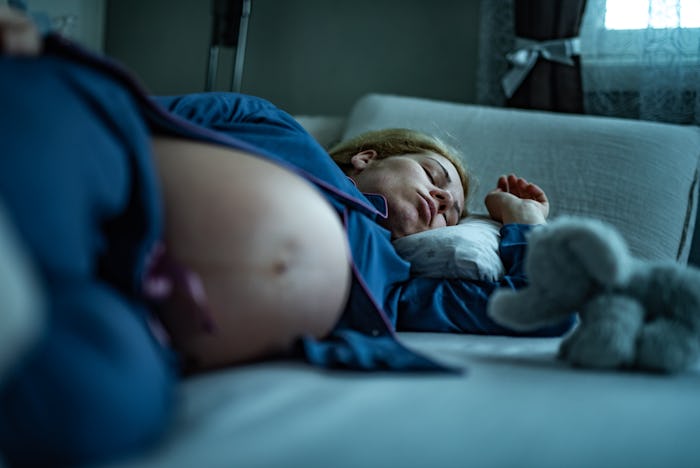Womb Life

Do Babies In The Womb Know When You Sleep? Experts Explain
When you're pregnant, you're constantly interacting with your baby, sometimes consciously, sometimes not. When you stand or change positions, your baby moves. When you talk or play music, they often react. But what all do they actually know about your interaction? And when they start kicking just as you drift off, do babies in the womb know you're asleep?
It turns out that babies are more conscious of us than we think they are, but that awareness isn't what we understand as awareness. Also, babies spend very little of their time aware of anything at all, because they are sleeping most of the time. Pediatrician Dr. Kim Langdon tells Romper, "Babies sleep 90 to 95% of the time in the second trimester and 85 to 90% in the third trimester. Most women claim that their baby starts to move more when they are resting or about to go to sleep, and doctors tell women to do fetal kick counts when they are resting, so this may be true."
Babies' "awareness" may be more reactionary and reciprocal than anything. We know this because there have been a few big studies on this in the past several years, and one of the studies out of the Japan Studies of Obstetrics and Gynecology found that "the level of relaxation of pregnant women may affect fetal behavior, particularly the rate of eye blinking." When the person carrying the baby is super chill, so are the eyes of the baby inside. The inverse is also true. The 2016 book Fetal Development: Research on Brain and Behavior, Environmental Influences, and Emerging Technologies underscores this idea, and added, "There is evidence that the function of the placenta is altered if the mother is anxious or depressed." Researchers then theorize that since the baby might not be necessarily cognitively aware of what they're experiencing (after all, those brains have zero point of reference), their bodies and brains might be reacting to the environment that they are in, which just so happens to be a human body. However, this is just stress versus relaxation, not necessarily sleeping, which is slightly different.
It is both absolutely wild and totally understandable that babies would sense their mother's moods and levels of relaxation. After all, they are growing and living inside of our bodies. If your house was shaking, you'd know it, right? That being said, do babies in the womb know when you're asleep? Maybe not, says pediatrician Dr. Steve Silvestro. He tells Romper, "Since we know that a fetus is asleep the vast majority of the time anyway, chances are good that she’s asleep much of the time that mom is asleep, too, and therefore not usually consciously aware of the difference."
Silvestro notes that many of his patients report increased activity from their babies when they are trying to sleep. While that might be because they're no longer being rocked to sleep by their mothers' movements, Silvestro says that it more likely is the result of the jerky motions babies make during their REM sleep cycle, and because it's particularly annoying when you're trying to sleep, you notice it more acutely.
"There are fewer movements, sounds, or other inputs from outside your body headed toward the baby [during sleep]. So in a way, we could say that even if a baby is asleep most of the time her mom is asleep and isn’t consciously aware that mom is sleeping, the types of messages that her growing body and brain get when you’re asleep will be different from when you’re awake," he adds. Again — the house-shaking scenario. So while babies in the womb might intuit on some level if you're asleep or if you're awake, mostly, they are just sleeping themselves, so they don't care one iota about your rest. Which is something that becomes painfully apparent once they are born.
Experts:
Dr. Kim Langdon, pediatriciann
Dr. Steve Silvestro, pediatrician and host of the "The Child Repair Guide" podcast
This article was originally published on